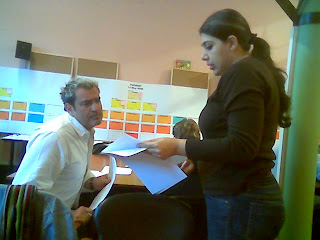Discussing the advocacy guide
 IDPC / IHRA Seminar in Lissabon (September 2007)
IDPC / IHRA Seminar in Lissabon (September 2007)*IDPC ADVOCACY GUIDE: Version Two*
The second version of the IDPC Advocacy Guide provides an update on the
emerging process for the review of global policies on controlled drugs
being conducted under the auspices of the United Nations. It describes
the latest situation on the planning for the review, and sets out the
IDPC position on which issues need to be addressed in the review, and
how these issues may be tackled in order to achieve a constructive
outcome. The guide is currently available in English (through the link
below), and a Spanish language version will be available on the IDPC
website in early January.
http://www.idpc.info/php-bin/documents/IDPC_Advocacy_v2_Dec2007.pdf**
**
*INTERNATIONAL HARM REDUCTION ASSOCIATION (IHRA) ‘The Death Penalty for
Drug Offences: A Violation of International Human Rights Law’*
On 10^th December 2007 – International Human Rights Day – IHRA released
a major report calling for an end to the use of the death penalty for
drug offences around the world. The report argues that the on-going
execution of drug offenders is a violation of international human rights
law.
http://www.idpc.info/php-bin/documents/IHRA_%20DeathPenaltyforDrugOffences_EN.pdf.pdf* *
**
*BECKLEY** BRIEFING PAPER 13. "At A Crossroads: Drug Trafficking,
Violence and the Mexican State"*
In this joint WOLA-BECKLEY policy brief, the authors provide an overview
of current and past drug policies implemented by the Mexican government,
with a focus on its law enforcement efforts. It analyzes the trends in
the increased reliance on the Mexican armed forces in counter-drug
activities and the role that the United States government has played in
shaping Mexico's counter-drug efforts.
http://www.idpc.info/php-bin/documents/WOLA_Beckley_BP_Crossroads_EN.pdfhttp://www.idpc.info/php-bin/documents/WOLA_Beckley_BP_Crossroads_ES.pdf* *
* *
*BECKLEY** BRIEFING PAPER 14. "The Effects of Decriminalisation of Drug
Use in Portugal"*
In 2004, the Beckley Foundation reported on the legal changes that took
place in Portugal in 2001, which effectively decriminalised the
possession and use of all drugs, and diverted those arrested into
education or treatment programmes (Allen, Trace, & Klein, 2004). This
report aims to provide an updated overview of the effects of these
changes, using data from the evaluations that have been carried out and
from new interviews with key stakeholders in Portugal.
http://www.idpc.info/php-bin/documents/BFDPP_BP_14_EffectsOfDecriminalisation_EN.pdf.pdf* *
*CORRELATION NETWORK REPORT: "Overcoming Barriers*:* Migration,
Marginalisation, and Access to Health and Social Services"*
The authors of this book come from a broad variety of professional and
geographical backgrounds. They examine barriers to health and social
services - and ways to overcome them - in their respective working
environments. The diversity of contributions produces rich information
and provides an overview of emerging issues and approaches related to
migration in different European regions.
http://www.idpc.info/php-bin/documents/CORR_RP_OvercomingBarriers_EN.pdf* *
*EVENTS*
*IDPC BRIEFING SESSION ON THE UN DRUG POLICY REVIEW - BRUSSELS, 10^th
DECEMBER*
As both governmental and NGO preparations for the review gather pace,
the IDPC has been collating and disseminating information and analysis
that is designed to help NGOs to understand how the UN system works, and
how they can engage constructively with government officials to promote
a positive outcome from the forthcoming review. As part of our ongoing
engagement with EU officials and governments, we will be hosting a
briefing session for delegates from the Horizontal Working Group on
Drugs, and other European stakeholders. This session will be an
opportunity for participants to meet informally to discuss the
procedural and substantive issues regarding the UN review.
http://www.idpc.info/php-bin/documents/IDPC_BP_BRUSSELS_Dec2007.pdf**
* *
*"BEYOND 2008" NGO Forum on Drugs and its Regional Consultations*
A Global NGO Forum contributing to the 10 year Review of Achievement
following the 1998 United Nations General Assembly Special Session
(UNGASS) on Illicit Drugs. The "Beyond 2008" process consists of a
series of regional NGO consultation meetings, culminating in a global
meeting in Vienna in July 2008. Details of all these events can be
downloaded from
www.vngoc.org <
http://www.vngoc.org/>
Regional consultation meetings have been successfully concluded in the
following regions in recent months:
Eastern Europe and Central Asia:
Kiev, 13 -14 September
Belgrade, 12 - 15 October
Sub-Saharan Africa:
Johannesburg, 26 - 28 October
Dakar, 2 - 4 November
Nairobi, 9 - 11 November
Latin America and the Caribbean:
Lima, 11 - 13 November
North Africa and the Middle East:
Cairo, 25 - 26 October
Southeast Asia, East Asia and the Pacific:
Macau, 31 October - 1 November
Further regional consultation meetings are scheduled over the next few
months in:
South Asia
Dhaka, Bangladesh - January 8 & 9, 2008
Europe
Budapest, Hungary - January 24 &25, 2008
North America
St. Petersburg, Florida (USA) - January 24 & 25, 2008
Vancouver, British Columbia (Canada) - February 4 & 5, 2008
Australasia
Wellington, New Zealand - February 19^th , 2008
* *
* *
*European Outreach Work Conference*: /*Perspectives on outreach work in
Europe.*/*/ //Reaching youth at risk - working towards social inclusion/*
The focus of the conference is early intervention and youth at risk, and
the aim is to gather practitioners, researchers, policy planners and
outreach workers from all over Europe to exchange of best practice,
research and training/education. The conference takes place in Oslo 22 -
24 April 2008. For more information, please check:
www.outreachwork.no<
http://www.outreachwork.no/>
























![Validate my Atom 1.0 feed [Valid Atom 1.0]](http://hardcoreharmreducer.be/picture%20library/valid-atom.png)